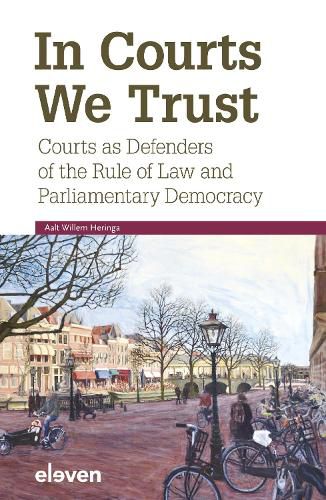Readings Newsletter
Become a Readings Member to make your shopping experience even easier.
Sign in or sign up for free!
You’re not far away from qualifying for FREE standard shipping within Australia
You’ve qualified for FREE standard shipping within Australia
The cart is loading…






This title is printed to order. This book may have been self-published. If so, we cannot guarantee the quality of the content. In the main most books will have gone through the editing process however some may not. We therefore suggest that you be aware of this before ordering this book. If in doubt check either the author or publisher’s details as we are unable to accept any returns unless they are faulty. Please contact us if you have any questions.
In this farewell speech on the occasion of his retirement as Professor of Comparative Constitutional Law at Maastricht University, given in March 2022, Aalt Willem Heringa discusses the too often ignored role of courts as interpreters of statutes. The courts, by checking the (constitutional) quality of statutes, contribute to the rule of law and parliamentary democracy.
Independent courts may add to the confidence in a constitutional and parliamentary system as a whole, by being in a position to decide cases on contentious issues as an authoritative third branch of government. Moreover, courts can also make it visible to all that not only are citizens bound by the law, but that rules and fundamental principles also apply to politicians. Being subject to legal rules is not an indication of weakness, as politicians often want us to believe. On the contrary, it is an expression of strength: the strength of the safeguards for the proper functioning of our political system, which is embedded in the law.
Furthermore, Heringa puts forward proposals on how to embed this essential role and function of courts into the Dutch constitutional order. He also shows how courts are an essential feature that builds trust in the constitutional system, allows for the protection of individual rights and fundamental values and even leads to a strengthening of parliamentary democracy.
$9.00 standard shipping within Australia
FREE standard shipping within Australia for orders over $100.00
Express & International shipping calculated at checkout
This title is printed to order. This book may have been self-published. If so, we cannot guarantee the quality of the content. In the main most books will have gone through the editing process however some may not. We therefore suggest that you be aware of this before ordering this book. If in doubt check either the author or publisher’s details as we are unable to accept any returns unless they are faulty. Please contact us if you have any questions.
In this farewell speech on the occasion of his retirement as Professor of Comparative Constitutional Law at Maastricht University, given in March 2022, Aalt Willem Heringa discusses the too often ignored role of courts as interpreters of statutes. The courts, by checking the (constitutional) quality of statutes, contribute to the rule of law and parliamentary democracy.
Independent courts may add to the confidence in a constitutional and parliamentary system as a whole, by being in a position to decide cases on contentious issues as an authoritative third branch of government. Moreover, courts can also make it visible to all that not only are citizens bound by the law, but that rules and fundamental principles also apply to politicians. Being subject to legal rules is not an indication of weakness, as politicians often want us to believe. On the contrary, it is an expression of strength: the strength of the safeguards for the proper functioning of our political system, which is embedded in the law.
Furthermore, Heringa puts forward proposals on how to embed this essential role and function of courts into the Dutch constitutional order. He also shows how courts are an essential feature that builds trust in the constitutional system, allows for the protection of individual rights and fundamental values and even leads to a strengthening of parliamentary democracy.